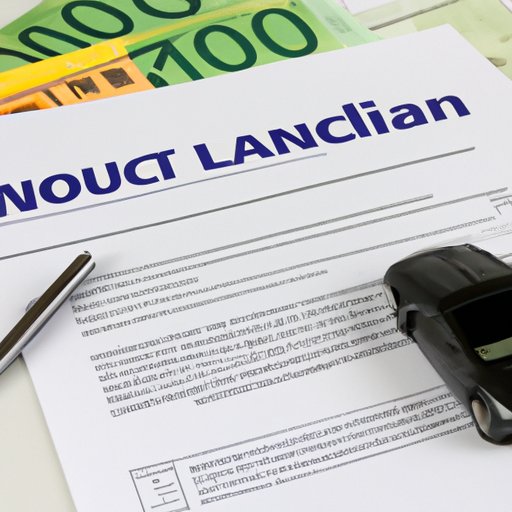Introduction
If you have a financed car that you no longer want or need, you may be wondering if it’s possible to trade it in for another vehicle. The answer is yes, but there are several things to consider before doing so. In this article, we will explore the process of trading in a financed car, the pros and cons, what to consider, steps involved, and alternatives to trading in a financed car.

How to Trade in a Financed Car for Another Vehicle
The first step in trading in a financed car is to understand your financing agreement. This document outlines the terms of your loan, including the amount you owe, the length of the loan, and any additional fees associated with it. It’s important to be aware of all of these details before attempting to trade in your vehicle.
Once you’ve reviewed your financing agreement, contact your lender to discuss the possibility of trading in your vehicle. Depending on the lender, they may allow you to trade in your car while still owing money on it. If they do, they will likely require you to pay off the remaining balance before they will release the title of the vehicle.
Once you’ve negotiated the terms with your lender, you’ll need to finalize the deal with the new lender. This will involve providing them with the necessary paperwork, such as a copy of your driver’s license and proof of insurance. You’ll also need to provide them with the title of the vehicle you’re trading in, which the previous lender should have released to you once the balance was paid off.

Evaluating the Pros and Cons of Trading in a Financed Car
When considering whether or not to trade in a financed car, it’s important to weigh the pros and cons. One of the main benefits of trading in a financed car is that it can help you save time and money. Because you don’t have to go through the process of selling your vehicle on your own, you can avoid the hassle of advertising, showing the car, and negotiating the price. Additionally, trading in a financed car can reduce the amount of money you need to finance the purchase of your new vehicle.
On the other hand, there are some disadvantages to trading in a financed car. For one, you may not get as much money for your trade-in as you would if you sold it on your own. Additionally, you may be charged additional fees by the dealership or lender, such as transfer fees or early termination fees.
What to Consider Before Trading in a Financed Car
Before trading in a financed car, there are a few things you should consider. First, you should evaluate the value of your current vehicle. Research similar vehicles to determine how much it’s worth and use this information to negotiate the best possible price for your trade-in. Additionally, you should consider the cost of the new vehicle and the fees associated with trading in a financed car.
The Steps Involved in Trading in a Financed Car
Once you’ve decided to trade in a financed car, there are several steps involved in the process. First, you’ll need to find a dealer who accepts trades. Once you’ve found a dealer, you’ll need to get an estimate for your trade-in value. This will give you a better idea of how much money you can expect to receive for your trade-in.
Next, you’ll need to negotiate the terms of the trade. This includes discussing the amount of money you can receive for your trade-in, as well as any additional fees associated with the transaction. Finally, you’ll need to sign the necessary documents to complete the trade.

Understanding Your Rights When Trading in a Financed Car
It’s important to understand your rights when trading in a financed car. First, you should know the laws in your state regarding trading in a financed car. Additionally, you should understand the difference between financing and leasing, as well as any potential early termination fees that may be associated with the transaction.
Exploring Alternatives to Trading in a Financed Car
If you decide not to trade in your financed car, there are several alternatives you can explore. For example, you can sell your vehicle privately, which may help you get more money for your trade-in. Additionally, you may be able to refinance your loan or donate your vehicle to a charity.
Conclusion
Trading in a financed car is a common practice, but it’s important to understand the process and evaluate the pros and cons before making a decision. Additionally, you should consider the value of your current vehicle, the cost of the new vehicle, and any fees associated with trading in a financed car. Finally, it’s important to understand your rights when trading in a financed car and explore alternatives such as selling your vehicle privately, refinancing your loan, or donating your vehicle.
(Note: Is this article not meeting your expectations? Do you have knowledge or insights to share? Unlock new opportunities and expand your reach by joining our authors team. Click Registration to join us and share your expertise with our readers.)
